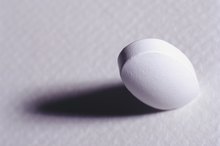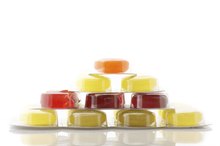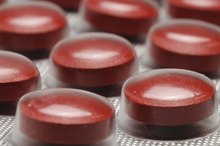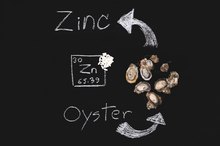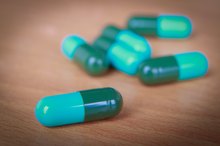Chelated Zinc Side Effects
Healthy adult men should have 11 milligrams of zinc daily, while women need 8 milligrams per day. (See Reference 1) A varied diet supplies most Americans with enough, but the elderly, vegans, strict vegetarians and people who have kidney disease or a digestive disorder like ulcerative colitis or celiac disease may benefit from a zinc supplement. (See Reference 1) Non-prescription zinc supplements are chelated, meaning they contain the mineral bound to another compound. (See Reference 2) Common chelated zinc supplements include zinc picolinate and zinc citrate. (See Reference 3) Talk to your doctor about possible side effects before taking any form of chelated zinc.
Common Side Effects
The most commonly reported side effects of moderate chelated zinc supplementation include an upset stomach, vomiting and nausea. You may also notice your mouth developing a metallic aftertaste. (See Reference 3) High doses may cause dizziness, excessive sweating, unexplained tiredness, headache, fever, chest pain, fainting, chills, vomiting, sores in your mouth or throat, shortness of breath, yellow skin or eyes and an increased risk of infections due to a suppressed immune system. (See Reference 3 and 4) Taking a large amount of chelated zinc may also lower your HDL, or "good," cholesterol level while increasing your LDL, or "bad," cholesterol. (See Reference 3 and 5)
- The most commonly reported side effects of moderate chelated zinc supplementation include an upset stomach, vomiting and nausea.
- See Reference 3 and 4) Taking a large amount of chelated zinc may also lower your HDL, or "good," cholesterol level while increasing your LDL, or "bad," cholesterol.
- (
Increased Risk of Anemia
Zinc Citrate Side Effects
Learn More
Taking chelated zinc inhibits your body's ability to absorb copper and may cause a copper deficiency. (See Reference 3) Inadequate copper can cause you to develop anemia since copper is required for the production of red blood cells. (See Reference 2) If you choose to take zinc supplements, you should also take a copper supplement, spacing the minerals approximately two hours apart. (See Reference 4) Have your doctor help you establish a safe dosage for each mineral.
- Taking chelated zinc inhibits your body's ability to absorb copper and may cause a copper deficiency.
- ( See Reference 3) Inadequate copper can cause you to develop anemia since copper is required for the production of red blood cells.
- (
Medication Interactions
Chelated zinc supplements may interfere with your body's ability to absorb tetracycline and quinolone antibiotics such as ciprofloxacin, demeclocycline and norfloxacin. (See Reference 3) Take these antibiotics two hours before or after your zinc, advises the Linus Pauling Institute. (See Reference 1) Avoid taking zinc if you are on amiloride, a diuretic that raises your blood's concentration of zinc. In addition, do not use chelated zinc if you have been prescribed an ACE inhibitor for your blood pressure, penicillamine, deferoxamine or the chemotherapy drug cisplatin. (See Reference 3)
- Chelated zinc supplements may interfere with your body's ability to absorb tetracycline and quinolone antibiotics such as ciprofloxacin, demeclocycline and norfloxacin.
- ( In addition, do not use chelated zinc if you have been prescribed an ACE inhibitor for your blood pressure, penicillamine, deferoxamine or the chemotherapy drug cisplatin.
- (
Dangers of Large Doses
Side Effects of Zinc Lozenges
Learn More
The tolerable upper intake level, or UL, of zinc is 40 milligrams per day. This means that if you take more than 40 milligrams of chelated zinc each day, you have a greater risk of developing potentially harmful side effects. (See Reference 1) A study published in the "Journal of Urology" in 2007 found that subjects taking 80 milligrams of zinc daily for over six years were significantly more likely to require hospitalization for urinary problems, including kidney failure, urinary tract infections and benign prostatic hyperplasia. (See Reference 6)
- The tolerable upper intake level, or UL, of zinc is 40 milligrams per day.
- See Reference 1) A study published in the "Journal of Urology" in 2007 found that subjects taking 80 milligrams of zinc daily for over six years were significantly more likely to require hospitalization for urinary problems, including kidney failure, urinary tract infections and benign prostatic hyperplasia.
- (
Related Articles
References
- Linus Pauling Institute: Zinc
- Ask the Dietitian: Zinc
- University of Maryland Medical Center: Zinc
- Drugs.com: Zinc Chelated
- National Institutes of Health: Zinc
- The Journal of Urology: High Dose Zinc Increases Hospital Admissions Due to Genitourinary Complications
- Kara, E., Gunay, M., Cicioglu, I., Ozal, M., Kilic, M., Mogulkoc, R., & Baltaci, A. K. (2010). Effect of zinc supplementation on antioxidant activity in young wrestlers. Biological Trace Element Research, 134(1), 55-63. Â
- Prasad, A. S., Mantzoros, C. S., Beck, F. W., Hess, J. W., & Brewer, G. J. (1996). Zinc status and serum testosterone levels of healthy adults. Nutrition, 12(5), 344-348.
- Yang, Y., Jing, X. P., Zhang, S. P., Gu, R. X., Tang, F. X., Wang, X. L., ... & Wang, J. Z. (2013). High dose zinc supplementation induces hippocampal zinc deficiency and memory impairment with inhibition of BDNF signaling. PLoS One, 8(1), e55384.
- Amani, R., Saeidi, S., Nazari, Z., & Nematpour, S. (2010). Correlation between dietary zinc intakes and its serum levels with depression scales in young female students. Biological Trace Element Research, 137(2), 150-158.
- Table, E., & Table, V. (2001). Dietary reference intakes for vitamin A, vitamin K, arsenic, boron, chromium, copper, iodine, iron, manganese, molybdenum, nickel, silicon, vanadium, and zinc.
- Wilborn, C. D., Kerksick, C. M., Campbell, B. I., Taylor, L. W., Marcello, B. M., Rasmussen, C. J., ... & Kreider, R. B. (2004). Effects of zinc magnesium aspartate (ZMA) supplementation on training adaptations and markers of anabolism and catabolism. Journal of the International Society of Sports Nutrition, 1(2), 12.
- Brilla, L. R., & Conte, V. (2000). Effects of a novel zinc-magnesium formulation on hormones and strength. Journal of Exercise Physiology Online, 3(4), 26-36.
- Kara, E., Gunay, M., Cicioglu, I., Ozal, M., Kilic, M., Mogulkoc, R., & Baltaci, A. K. (2010). Effect of zinc supplementation on antioxidant activity in young wrestlers. Biological Trace Element Research, 134(1), 55-63. Â
- Bao, B., Prasad, A. S., Beck, F. W., Fitzgerald, J. T., Snell, D., Bao, G. W., ... & Cardozo, L. J. (2010). Zinc decreases C-reactive protein, lipid peroxidation, and inflammatory cytokines in elderly subjects: a potential implication of zinc as an atheroprotective agent. The American Journal of Clinical Nutrition, 91(6), 1634-1641.
- Espinoza, A., Le Blanc, S., Olivares, M., Pizarro, F., Ruz, M., & Arredondo, M. (2012). Iron, copper, and zinc transport: inhibition of divalent metal transporter 1 (DMT1) and human copper transporter 1 (hCTR1) by shRNA. Biological Trace Element Research, 146(2), 281-286.
- Tandy, S., Williams, M., Leggett, A., Lopez-Jimenez, M., Dedes, M., Ramesh, B., ... & Sharp, P. (2000). Nramp2 expression is associated with pH-dependent iron uptake across the apical membrane of human intestinal Caco-2 cells. Journal of Biological Chemistry, 275(2), 1023-1029.
- Festa, M. D., Anderson, H. L., Dowdy, R. P., & Ellersieck, M. R. (1985). Effect of zinc intake on copper excretion and retention in men. The American Journal of Clinical Nutrition, 41(2), 285-292
Writer Bio
A professional writer since 2001, Lyn Michaud has been published in educational encyclopedias, including "Encyclopedia of Global Health" and "Encyclopedia of Global Warming and Climate Change." She holds degrees in biology and chemistry and spent three years as a board member for Weld City Board of Health.
